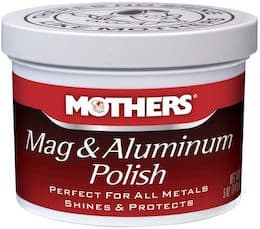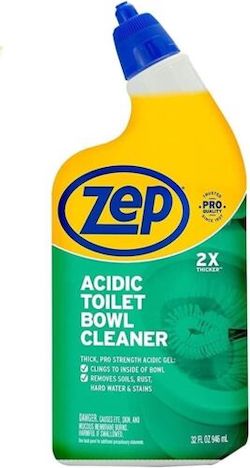
-----
Tile contractor's muriatic acid corroded our stainless steel appliances
Q. Our general contractor recently used Muriatic Acid and water to clean the tile floor. All the stainless steel cooking appliances in the room have developed a sticky brownish layer of corrosion, even the overhead exhaust hood which could only have come in contact with the fumes.
My Question: Is there any way to stop the reaction (neutralize the acid) in the area? Is it likely that the fumes are still escaping from the tile floor? I fear that the fumes may also attack the HVAC equipment in the area. My kitchen equipment supplier says the corrosion will continue to come back indefinitely unless repeatedly protected by a thin layer of oil.
Any experience with this type situation or suggestions are welcomed.
Harry Wilfong- Hartsville, South Carolina
2002
Q. I am having the same problem and have not been able to get answers from my contractor. Has anyone come up with a solution?
Ken Campbell- Lake Placid, Florida, USA
2004
A. I can't comment on your particular situation, sight unseen. But I would never let a contractor apply hydrochloric acid inside my house, and would suggest that it is very likely to be the cause of the rusting of the stainless steel. Eventually the fumes will dissipate, but I suppose that washing things with baking soda [in bulk on eBay or Amazon [affil link] would be useful if the acid application was recent.
I've done ceramic and porcelain tiling many times, and what happens is this: after sponging the grout across the tiles and into the grout lines, you must sponge-wipe the tile again & again & again (and many more agains), emptying and refilling the rinse bucket again & again & again to get the haze off while it's still wet. And just when you think you're done, the sponge touches the grout line and drags a bit of grout onto the tile, and away we go again.
If you do this there is no need for acid! But it's a huge lot of labor, and time is money. So professionals often give it a couple of quick passes, and allow a grout haze to remain on the tile, which they remove with acid after it has dried. This may not be too bad if they use a "safe" acid, but muriatic acid is not actually a liquid acid, it's a gas dissolved in water like the fizzing very mild acid in Coke or Pepsi ... and as the acid is sloshed around, the gas fumes come out and can ruin metal without even having to have the liquid touch it. Your appliances may be ruined. What you are seeing on the outside is probably affecting the hidden wiring and electronics as well.

Ted Mooney, P.E.
Striving to live Aloha
finishing.com - Pine Beach, New Jersey
Ted is available for instant help
or longer-term assistance.
A. When I use hydrochloric (muriatic) acid, I have simply used a baking soda [in bulk on eBay or Amazon [affil link] solution to neutralize excess acid. Don't know if will work in your case but I would try mixing a solution of 3/4 to 1 cup of baking soda with a gallon of water and scrub the affected areas with it. Should do the trick. Good Luck
Charles Ogden- Poplar Bluff, Missouri USA
December 11, 2012
Q. I also used muriatic acid on my kitchen floor and it ruined all of my stainless cookware that was hanging on a pot rack mounted on the ceiling. It looks like the worst kind of water spots. It also had an effect on the range.
Can I reverse the damage to the stainless as it is not etched, just discolored with white spots. I tried vinegar
⇦in bulk on
eBay
or
Amazon [affil link] and it didn't help. I am also worried about inhaling the fumes.
- Biloxi, Mississippi, USA
March 22, 2013
A. Hi Lily. Charles' suggestion of a baking soda wash is probably the best idea.
Acid fumes are clearly not good for you, but they have probably largely dissipated by now, and the baking soda will help even further. Some people work in plating shops with very strong muriatic acid fumes every day and survive it just fine for decades. I am NOT claiming the fumes are utterly harmless, I'm just saying that considering the ever-present dangers in life, if you weren't hurt at the time, there is no reason to obsess about this very diluted issue. Good luck,
Regards,

Ted Mooney, P.E.
Striving to live Aloha
finishing.com - Pine Beach, New Jersey
Ted is available for instant help
or longer-term assistance.
!! My cleaning partner and I recently used a product called "BeatsAll Tile & Grout Cleaner" marked "CAUSTIC" and "unsafe for all metal" to clean the tile in an entire new house (no ingredients listed). As directed on the label, we applied it carefully to the tile without splashing (spilling, not spraying), scrubbed it with the special applicator brush (essentially a long-handled scrub-brush, made in Italy) and rinsed with warm soapy water. Next day, there were unsightly spots on 3 new kitchen appliances (stainless steel isn't un-stainable, it turns out!) and a hazy orange "rust" over the entire surfaces of all exposed stainless except the kitchen faucet. (Maybe that was pewter finish?)
We used every product we had in our attempt to remove the spots, including metal cleaners, with limited results.
The company returned my call for help and suggested "Mothers Mag and Metal Polish" from an auto supply store. They said that would remove the stains and they would not return. We found "Mother's Mag and Aluminum Polish". It's a paste type, I think.
Unfortunately I don't have the rest of the story yet.
The owner likes the idea of getting the skins (front decor panels) of the appliances replaced. (Ouch, my purse. But probably cheaper than new appliances! I didn't realize that was possible, until now). Lesson learned: don't let messy tile guys leave without cleaning first! Caustic substances are no joke.
- Port Charlotte, Florida
March 16, 2016
A. Hi Victory. According to the label, that tile cleaner contains inhibited hydrochloric acid. Inhibited or not, I would not use it in my house. I think there's a good chance that the Mother's Polish can remove the corrosion because it's a polish, not just a chemical reagent. But you may find that you need to use it on a buffing wheel in a low-power battery operated drill, or with a buffing pad on a hand-held orbital sander because it's hard to get enough "oomph" with your hands alone.
Regards,

Ted Mooney, P.E. RET
Striving to live Aloha
finishing.com - Pine Beach, New Jersey
Ted is available for instant help
or longer-term assistance.
![]() So glad we found this site. The contractor cleaning our natural stone with some sort of acid left a streak down the front of our outdoor refrigerator and splatters on the other grill doors. We first washed it down with baking soda as someone recommended to neutralize the acid. We them bought the Mother's Mag and Metal polish and used buffing pads on an electric drill. Very happy with the outcome. One would have to know where the streak was to see an indication of it. Thanks everyone.
So glad we found this site. The contractor cleaning our natural stone with some sort of acid left a streak down the front of our outdoor refrigerator and splatters on the other grill doors. We first washed it down with baking soda as someone recommended to neutralize the acid. We them bought the Mother's Mag and Metal polish and used buffing pads on an electric drill. Very happy with the outcome. One would have to know where the streak was to see an indication of it. Thanks everyone.
May 12, 2016
- Franklin, Tennessee USA
A. I hear this story all the time.
An abrasive/polish product will remove the corrosion, yes, but the best thing is to repassivate too.
adv.
We offer products that will clean up the corrosion (usually with no scrubbing required) and passivate at the same time.

Ray Kremer
Stellar Solutions, Inc.
McHenry, Illinois

Q. "passivate"
v.t. -vated, -vating.
1. to treat (a metal) to render the surface less reactive chemically.
Citation: Random House Kernerman Webster's College Dictionary, © 2010 K Dictionaries Ltd. Copyright 2005, 1997, 1991 by Random House, Inc. All rights reserved.
Both replies add excellent info. I just had to look up this new word and thought I'd share it for others' convenience. :-)
I don't know where you read the ingredients, my bottle didn't specify... (I assumed the company didn't have to list because it wasn't food), but it's good to know. I wonder what the difference is between inhibited and uninhibited hydrochloric acid or HCl (a.k.a. muriatic acid, according to another post in this thread). I'm no chemist, but I know HCl (stomach acid) burns skin and leaves a "birthmark"-type pink stain as a permanent scar. My brother had an unfortunate accident that marked his tummy with a 2" spot. I think it's unfortunate this stuff isn't warned better. Caveat Emptor (let the buyer beware), I suppose.
- Port Charlotte, Florida
April 8, 2016
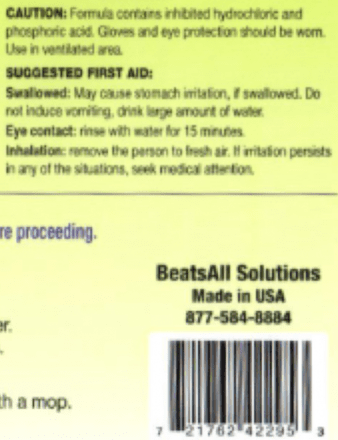
A. Hi again, Victory. Unfortunately your dictionary citation didn't translate completely because accent marks, pronunciation hints, etc. on keyboards are not accepted correctly by e-mail and HTML. Also, although your definition of 'passivate' is correct, it additionally has a rather specialized and reserved meaning when applied to a specific process for stainless steel.
I think we have a similar issue of a specialized and reserved meaning for the word "inhibited" when applied to a pickling acid, like hydrochloric acid. It means that special organic compounds have been added to help the acid dissolve rust in favor of steel.
We obviously don't know the formulation of such proprietary products, including whether there is a lot of HCl in it or only the faintest wisp; but my own experience from seeing the corrosion damage in plating shops, and from posting many stories of damage from HCl-based grout cleaners, is that I would never use any HCl in my own home. Others may see it differently; the product does have largely favorable reviews on Amazon.
Regards,

Ted Mooney, P.E. RET
Striving to live Aloha
finishing.com - Pine Beach, New Jersey
Ted is available for instant help
or longer-term assistance.
A. Hello Victory. As your name implies, you don't settle for less than Victory!
adv.
Therefore to remove that stain you can and will obtain Victory with using Scratch-B-Gone on those stains. Used by grout and tile contractors nationally, our kit is very effective to lift this discoloration while restoring finish. Good Results Ahead.

Barry Feinman - Chief Restoration Officer
BarrysRestoreItAll
Carlsbad, California

Q. We recently put new floors in the house and our installer used diluted muriatic acid to eat up the dust from the floors after installation was complete. He says he applied the diluted acid with a sponge, then wiped it immediately with water afterwards. 6 days later, I am realizing our stainless steel appliances are corroding ... every time I wipe them, they wipe brown.
HELP.
What can we do to fix this?
- MIAMI, FLORIDA
February 18, 2017
A. I have a 2000 square foot rental home with tile and extremely dingy grout. I used muriatic acid throughout to clean grout. I have stainless steel appliances. I used "ZEP acidic toilet bowl cleaner" to remove residue. Wipe on, wait 5 minutes, used elbow grease to work it out. Rinsed thoroughly (or it will rust) with water. Then polished with stainless steel appliance polish. Appliances came out good as new. Problem solved. Try it first in a small area to test for sure.
Joni Pintado- Vero Beach, Florida
!! Hi. As Joni says, try it on a small test area first. Even if you rinse it well and polish it, I find it hard to believe that a toilet bowl cleaner which itself reportedly contains 10% muriatic acid is good for stainless steel.
Regards,

Ted Mooney, P.E. RET
Striving to live Aloha
finishing.com - Pine Beach, New Jersey
Ted is available for instant help
or longer-term assistance.
Q. We recently completed a backyard remodel, including new BBQ Island w/stainless steel appliances/cabinets and concrete pavers surrounding this BBQ island. The contractor used a muriatic acid/water solution to "open up" the surface of the pavers. Less than 48 hours later, we noticed brown splatter spots on the lower 12--18" of the lower cabinets near the floor where the acid wash was accomplished.
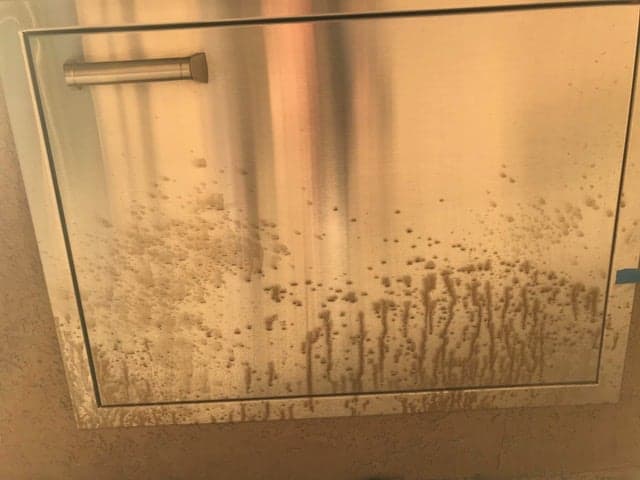
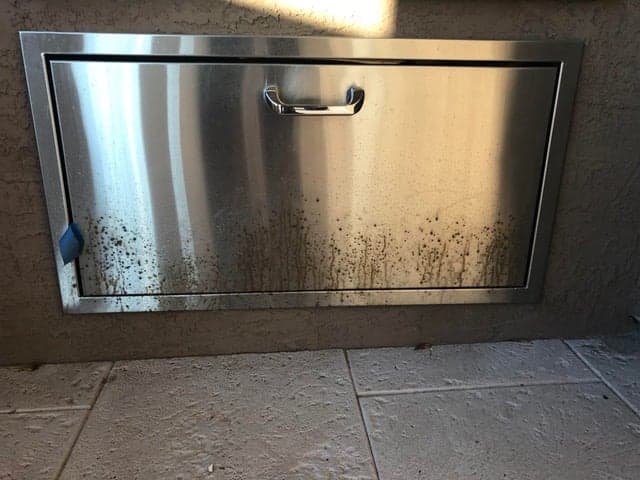
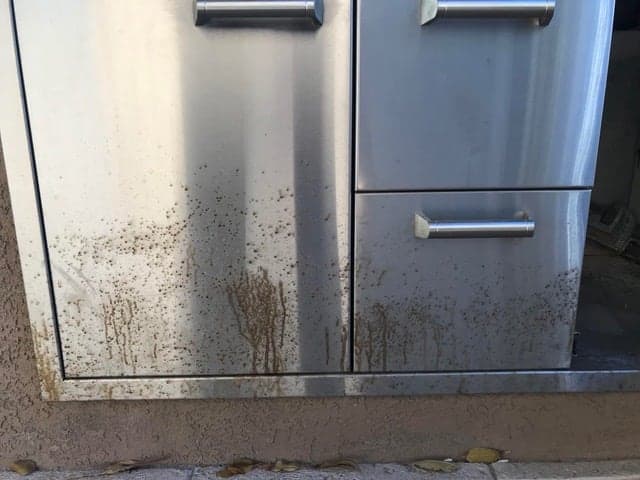
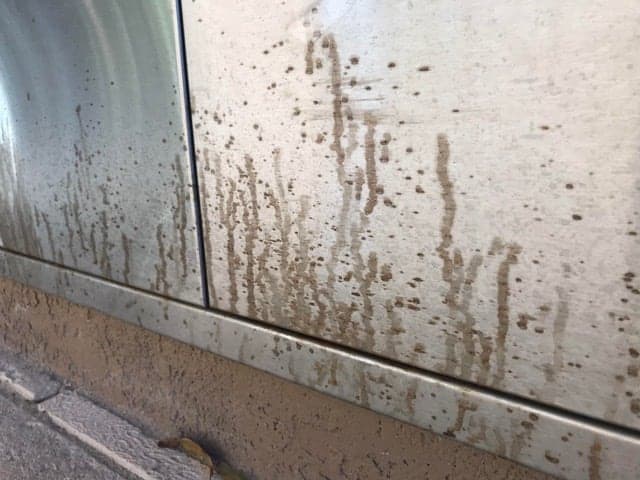
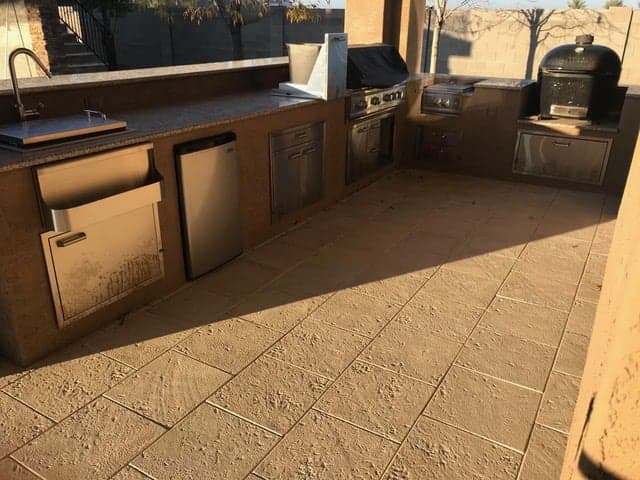
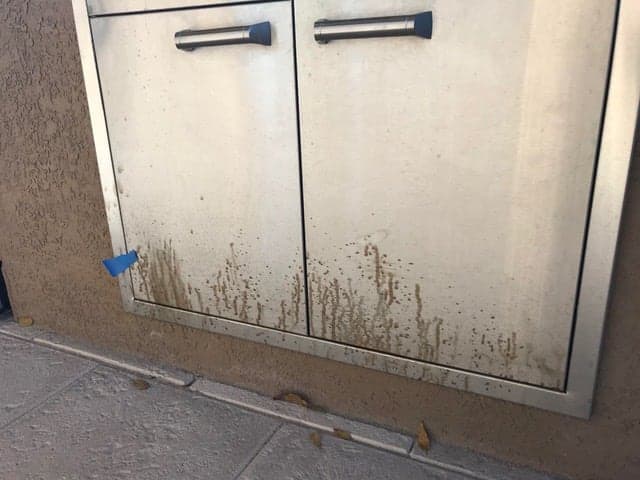
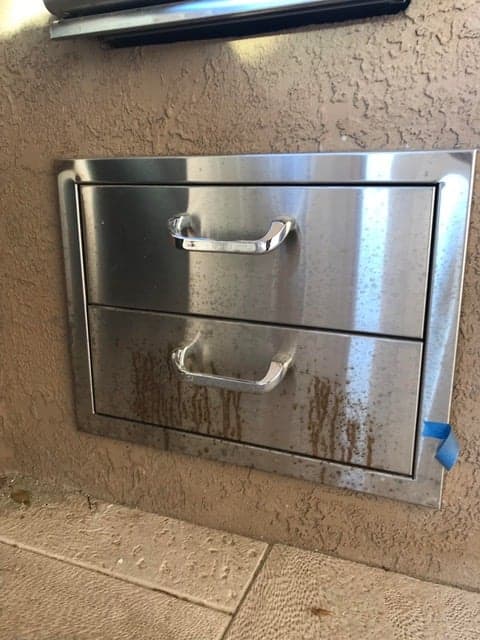
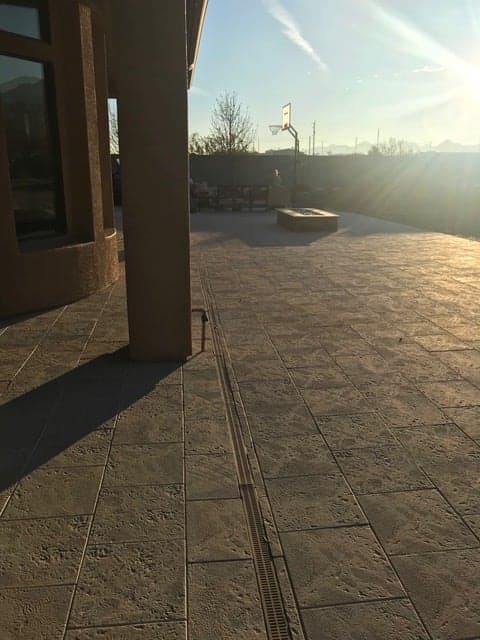
We suggested to the contractor that perhaps the acid wash caused the discoloration/damage. The contractor said, "no... it is simply dirt from the AZ dusty air." We tried using Simple Green to clean it off. Some of the brown came off, only to reappear within another 24-48 hours.
Carefully reading through this thread has been extremely informative. I would like to see if your experts could identify if this damage is, from their experience, due to that muriatic acid/water washing of the pavers.
Thank you...
- Gilbert, Arizona USA
January 17, 2019
A. Hi Michael. Expert witnesses must be qualified by the judge, study things first hand, and be compensated. But your photos are certainly consistent with damage from splashed acid :-)
I think you should neutralize everything by a washdown with a dilute baking soda and water mix, and then investigate purchasing some passivation solution to restore the stainless. Sooner is better than later as pitting damage is possible and difficult to stop.
Regards,

Ted Mooney, P.E. RET
Striving to live Aloha
finishing.com - Pine Beach, New Jersey
Ted is available for instant help
or longer-term assistance.
Q.
Thank you for your reply, Ted. Just to be clear, my goal was not to hijack another's posting nor gain free expert witness testimony. This field is not my area of expertise, however. Thus, I first need to determine if these pics were even consistent with what muriatic acid damage looks like, before pursuing anything further. Rather than further hijack this posting, I can respectfully post separately to gain more insight as to qualifications for an expert witness, costs of service, etc. If there has already been a posting for that info, I would gladly Akemi that link also.
Thank you...
- Phoenix, Arizona
January 2019
A. Hi Michael. Good luck; it's a huge disappointment to see your nice new outdoor kitchen damaged :-)
The intention of my reply was merely to warn you and other readers that although the damage is consistent with acid splashing, an internet opinion will carry no weight in a court of law. I certainly wasn't intending to be critical or curt -- sorry if it was seen that way.
Google gives essentially zero ranking to very short pages; since we want readers to find these postings, we would group similar postings together into themed pages anyway even if you had started new thread.
Regards,

Ted Mooney, P.E. RET
Striving to live Aloha
finishing.com - Pine Beach, New Jersey
Ted is available for instant help
or longer-term assistance.
Q. Strange situation ... Stainless appliances (all of a sudden) developed rust stains during 10 weeks of remodeling. Floors were buffed then re-sanded and restrained sheet rock repair, painting etc. Could fumes be the cause?
Christina Gale- Houston Texas
January 25, 2019
A. Hi Christina. "Remodeling" is probably not specific enough info for a good guess. Solvent fumes from wood floors, painting, etc. are probably harmless to metal. But acid fumes and bleach are very harmful to metal.
Regards,

Ted Mooney, P.E. RET
Striving to live Aloha
finishing.com - Pine Beach, New Jersey
Ted is available for instant help
or longer-term assistance.
Q. I had most of my house tile cleaned this morning. The grout had lots of Sheetrock dust. He ended up using some type of acid he "mixed". He came back with a rotary brush and water machine to remove the acid. I've had all my windows open all day with air vents running and fans. It's cold outside & getting dark so I had to close all windows. But me and my dog have been here all day and I have a bit of a headache and my throat's a little scratchy. We've been going outside for fresh air throughout the day. Are we in any danger staying here tonight? The smell is still here. Would Baking soda in containers absorb some of this? Should I mop floors with a baking soda solution? Thank you!
Gracie Smith- Baton rouge, Louisiana USA
January 30, 2019
A. Hi Gracie. Even an M.D. wouldn't attempt to diagnose your condition without an examination, so people with no medical knowledge like myself won't try :-)
But mopping with dilute baking soda can probably help and it can't hurt.
Regards,

Ted Mooney, P.E. RET
Striving to live Aloha
finishing.com - Pine Beach, New Jersey
Ted is available for instant help
or longer-term assistance.
! So, my bad, I, accidentally, must have splashed BeatsAll solution on the face of the SS dishwasher. It caused what looks like erosion to a small streak about 3-4 inches. I will try to buy product recommended herein to fix that. However, what was shocking to me and not included in the warning, was that overnight, the apparent fumes from what remained in the grout of the BeatsAll cleanser, caused a residue to begin to build up on the SS refrigerator and dishwasher door. I sprayed with my usual SS cleaner and my dish towel was completely rust colored. I then rewashed the floors multiple times until there seemed to be no more residue coming up from the grout (still not done). I have to say that BeatsAll product was a miracle in terms of removing dirt. Required very little elbow grease to apply and remove the dirt but what directions should have said was to repeatedly rinse the grout with clear water multiple times if there are any metal products nearby. What a horror story.
Kathleen Brehm- Naples, Florida
March 10, 2019
Q, A, or Comment on THIS thread -or- Start a NEW Thread
